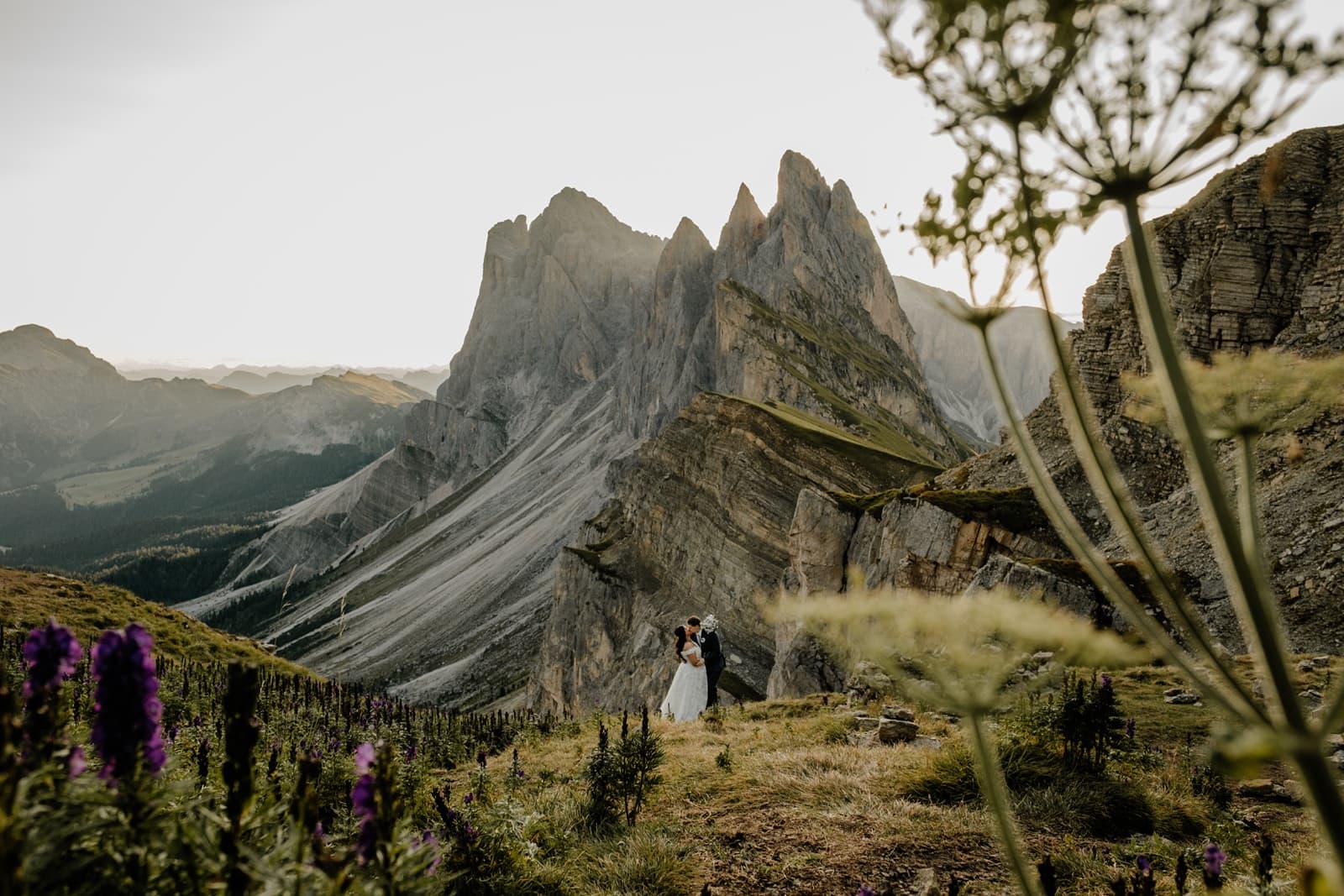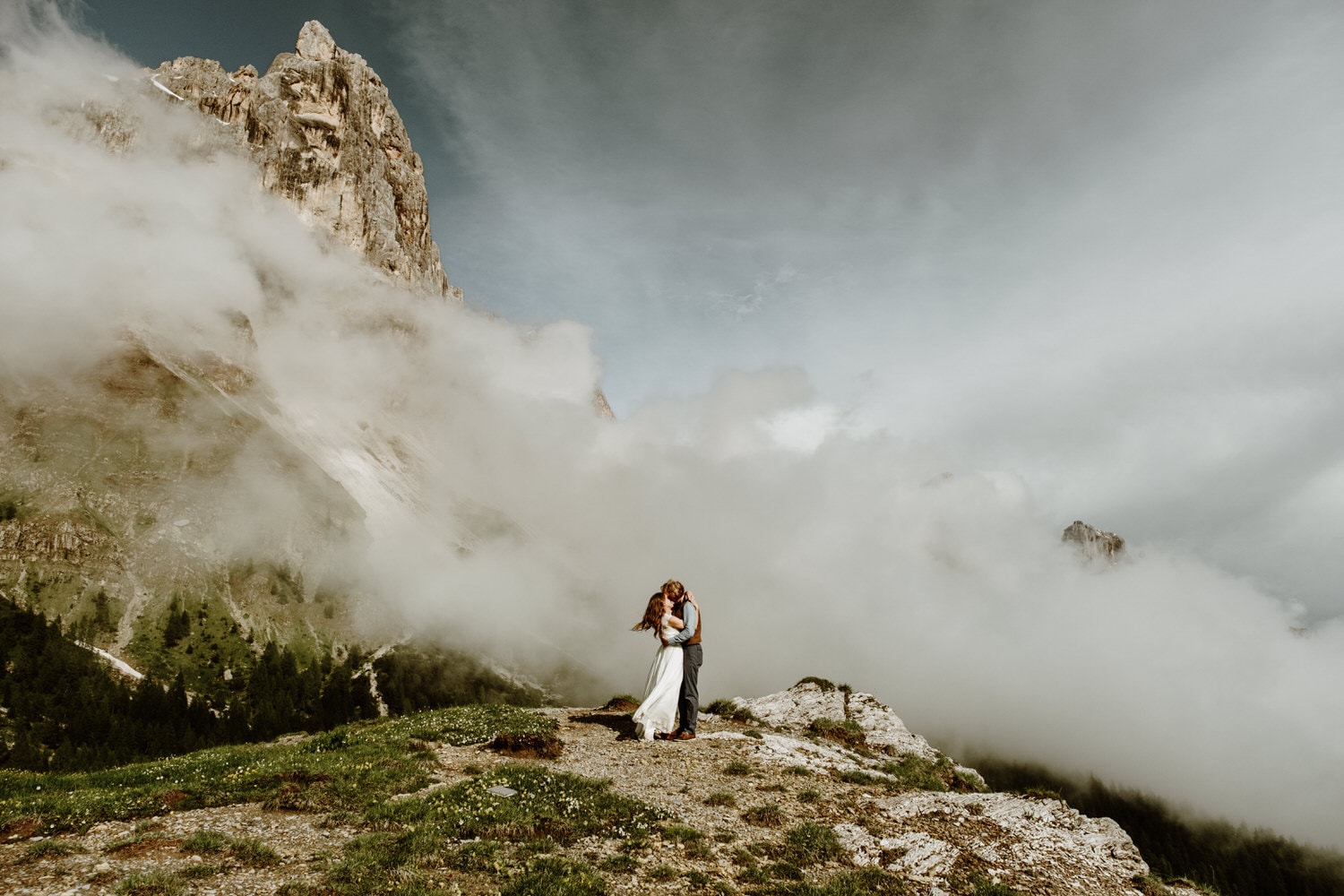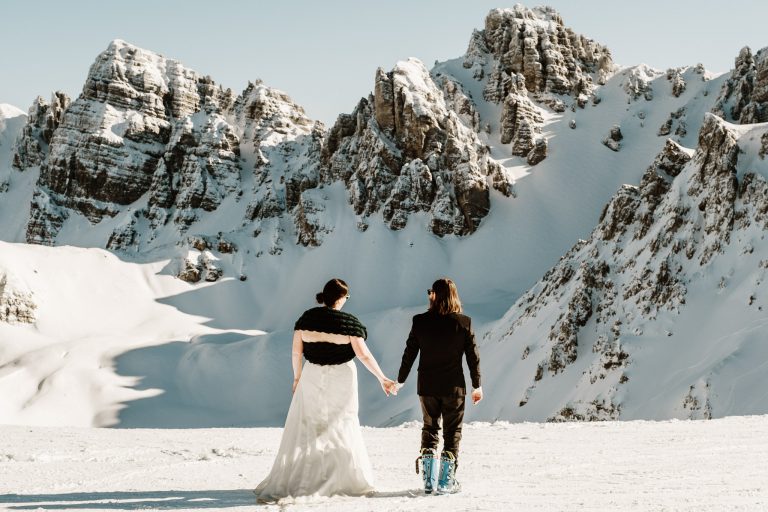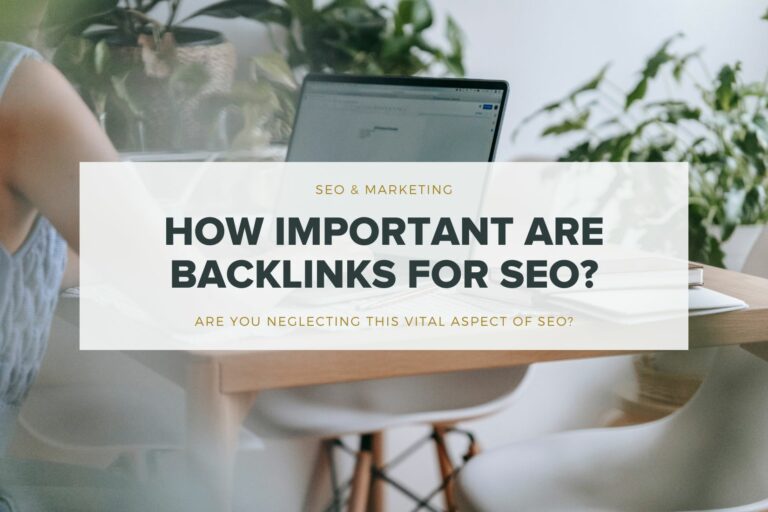Conscious Copywriting – 12 Words To Eliminate In Your Destination Wedding Marketing
In the world of destination weddings and elopements, we often find ourselves using a myriad of words to set the scene and to tell couples why a location might be the perfect place for them to get married. However, with great power comes great responsibility, and in the realm of ethical marketing, it’s important to understand how some words not only wield more influence than others but also the historical background of many of these words. In this exploration of conscious copywriting, we’ll delve into the ten words that are commonly used when talking about travel and destination wedding and elopement locations. From the allure of “bucket list” dreams to the mystique of “undiscovered” gems, we’ll uncover why these seemingly innocuous terms can be problematic, and explore how we can be more conscious about the words we choose to use.
Why Are Some Words Problematic?
Language is constantly evolving and is shaped by things such as cultural, social, and technological changes. Societal attitudes, cultural awareness, and ongoing conversations around inclusivity and respect can shine new perspectives on choices of language that may have been unquestioned until now. Below are just a few examples of the influences on language evolution:
Social Progress
As we become more aware of diverse experiences, our language adapts to be more inclusive. Words that were once commonly used may now be seen as offensive or disrespectful. For example, terms related to race, gender, sexual orientation, or disabilities have evolved as our understanding of these topics has deepened.
Cultural Sensitivity
Globalization has connected us in ways previously unimaginable. It’s essential to be culturally sensitive and avoid words that might be considered disrespectful or inappropriate in different cultures. What is acceptable language in one culture might be offensive in another.
Historical Context
Some words carry a heavy historical burden, reminding us of past discrimination, racism, or social injustice. Using these words can perpetuate harm and reinforce negative stereotypes. As societies confront their histories, many words are reconsidered.
Inclusivity
Language evolves to reflect diverse gender identities. Many languages are adapting to be more gender-inclusive, introducing gender-neutral pronouns and terms to acknowledge non-binary and genderqueer individuals.
Technological Influence
The digital age, social media, and internet culture have introduced new words, phrases, and slang into mainstream language. These words often reflect current trends, events, or phenomena and can quickly gain or lose popularity.
Awareness and Advocacy
Activism and advocacy movements play a significant role in shaping language. They challenge harmful language and promote terms that empower marginalized communities, fostering a more inclusive lexicon.
Generational Shifts
Younger generations often lead language change. New generations introduce fresh perspectives and slang, influencing how language is used and understood.
Media and Pop Culture
Movies, TV shows, books, and social media influencers impact language. They introduce new phrases, promote certain words, and influence how people express themselves.
Education and Academia
Educational institutions and scholars contribute to language evolution. They research, document, and promote the use of accurate and respectful terminology, shaping how language is used.
Language evolves as societies grow more aware, diverse, and inclusive. It’s a dynamic process influenced by social, cultural, technological, and educational factors. By being mindful of our language choices, we actively participate in this evolution, fostering more respectful and inclusive conversations.
Why Is Conscious Language Choice Important?
As a certified NLP practitioner and Transformational Coach, I’ve spent many hours studying the power of language. Language can influence how we think, how we feel, and how we act. Sometimes it’s conscious, but in many cases, it’s something that happens on an unconscious level.
Whether you like the term or not, we are all influencers.
As photographers, we share images and the stories behind them on our websites and on social media, as well as in the conversations we have people. The images we choose to share, and the words that accompany them have the ability to influence other people’s thoughts and actions, both positively and negatively.
On a side note: While the topic of image curation and which images we choose to share is also an important one, and very much a related discussion, to keep this article to the point, I’m only going to talk about the language we use in this article.

12 Words To Eliminate From Your Destination Wedding Marketing
We’ve looked at how language can evolve, so now let’s take a look at some specific examples of words that are commonly used when talking about destination weddings and elopements (and travel in general), and why they can be problematic:
Another side note: I feel it’s also important to say that I have used many of these words, many times. For so many of them, it’s just second nature, and I often do it automatically. But as I become more aware of the impacts of the language I am using, I am trying to be better at understanding the impacts that choosing certain words can have.
Bucket List
Origins of the term
The term bucket list comes from the phrase “to kick the bucket”, a.k.a dying. The “bucket list” is a list of things things someone wants to do, achieve, or experience before they die.
The term increased in popularity after the 2007 film “The Bucket List,” starring Jack Nicholson and Morgan Freeman. In the movie, two terminally ill men meet in a hospital and create a list of things they want to do before they “kick the bucket.” The film brought the concept of a bucket list into mainstream consciousness, and since then, it has become a popular way for people to set personal goals and aspirations for their lives.
Why It Can Be Problematic
The term “bucket list” can be problematic for a number of reasons. The term is often used in relation to places or experiences, so has a strong link with travel, including travel for destination weddings, elopements, and honeymoons. For example, posts like “10 Bucket List Elopement Destinations”, where the same locations are perpetually shared and promoted.
- Turns Places into Commodities
When a location or experience gets referred to as a “bucket list” item, it becomes a commodity. Something that simply needs to be ticked off a long list, rather than something someone chooses because they want to genuinely connect with a place and experience all aspects of it.
Are you encouraging couples to choose a location because of its rich and diverse culture and landscapes, or simply to travel to a location because it makes a pretty backdrop for photos? - Overcrowding
Bucket list locations often encourage travel to the same locations, regardless of whether these locations have the infrastructure or ability to handle increased numbers of visitors. Rather than encouraging people to explore a whole region, bucket lists often promote a small number of locations
Promoting certain destinations as “bucket list” spots can also contribute to environmental issues. Increased tourism can strain local resources, harm ecosystems, and create waste, impacting the natural beauty that attracted people there in the first place. - FOMO & Sense of Competition
While comparison and competition are a part of human nature, it doesn’t mean they are always healthy traits to have. The wedding industry already puts so much pressure on couples to look and act a certain way on their wedding, and to make certain choices that are seen to follow in line with industry norms. Whether that’s having a more extravagant wedding than someone else or choosing a location simply because it’s THE top destination that year.
Bucket lists may also influence couples to feel pressured to choose popular “bucket list” destinations, even if those places don’t necessarily align with their preferences or desires. - Building Unrealistic Expectations
Bucket list locations and experiences often end up on these lists because they are beautiful and memorable. But when a destination is hyped as a “bucket list” spot, couples may have unrealistically high expectations of it. They may picture an idyllic experience, but when reality doesn’t match their expectations, this can lead to disappointment, especially if they then encounter long lines for the best photo locations, overcrowding, and a general lack of intimacy. - Devalues Other Places & Experiences
Referring to some locations as “bucket list” locations and not others can unintentionally devalue the worth of destinations not on the “bucket list,” even though they may offer equally enriching experiences or beautiful landscapes.
Essentially, using the term “bucket list destination” can promote a superficial and checklist-oriented approach, that can lead to overcrowding, treating places as commodities, and creating unrealistic expectations.
I have personally experienced the impacts of certain locations in the Dolomites being regularly promoted as “bucket list locations” for elopements. There are perhaps 5 locations in particular that always make the lists of “must-see” spots and “best places to elope” lists for this area. What results is many couples only wanting to visit these locations, contributing to environmental damage from visiting already crowded locations, an experience that’s often less idyllic than they thought it would be (because they are sharing it with hundreds of other people), and missing out on so much more that the area has to offer.
Instead of promoting these bucket list locations or experiences, perhaps we can encourage people to choose destinations and experiences based on their personal interests, values, and a desire to connect with the world in a meaningful way, rather than just checking off places on a list.
Discover, Undiscovered, Conquer & Explore
The words “discover,” “explore,” and “conquer” may seem pretty inoffensive. Especially in the words used to describe elopements and adventure weddings, we may talk about discovering new locations, exploring a landscape or conquering a mountain peak.
However, it’s important to also acknowledge the historical context in which many of these words were used:
Discover & Undiscovered
The terms “discover” and “undiscovered” have often been used in the context of colonialism, where European explorers claimed to “discover” lands that were already inhabited and had rich cultures and histories. This Eurocentric perspective disregarded the indigenous peoples’ presence and contributions, leading to the cultural erasure and marginalization of people who may have lived and roamed in these places for thousands of years.
Just because a place is undiscovered to you, or your clients, it doesn’t mean it is undiscovered. If you’re going to keep using these words, use them in context. Even by simply changing your language to say “I discovered a location that was new to me“, you acknowledge that you probably aren’t the first person to ever be there, but that it’s the first time for you.
Explore
While exploration itself is not problematic, historically, exploration often involved the colonization and exploitation of new territories. Exploration was linked to imperialistic pursuits, where indigenous cultures were often exploited, oppressed, and sometimes eradicated in the process.
While you can still use the term “explore” in a contemporary context, it should be used thoughtfully and respectfully, with acknowledgment of its historical colonial implications, even though it has evolved over time to encompass a broader and more inclusive understanding of discovery and learning.
Conquer
The term “conquer” implies the use of force and control over others. In historical contexts, conquest often led to violence, displacement, and cultural suppression. Today, the term is seen as negative when used in relation to dominating or subjugating others.
We often refer to mountains as things to be or to have “conquered”, placing nature as something that we can dominate. However, mountains are not adversaries to be conquered; they are natural wonders that should be respected and appreciated. Using the term “conquer” can perpetuate a harmful mindset that humans are superior to nature and that the goal of interacting with natural environments is to assert control over them.
Instead of using the term “conquer,” consider using more respectful terms such as climb, scale, or ascend to convey a more respectful collaboration, reverence, and harmony with nature.
–
Using these terms without acknowledging their historical baggage can perpetuate harmful narratives and reinforce colonial perspectives, especially when white photographers and couples travel to destinations that are not primarily white. To promote more respectful and inclusive language, it’s important to be aware of the historical context, and your own privilege.
Wild or Wilderness
Historically, the term “wild” has often been used in a colonial context to describe unfamiliar, untamed, or uncivilized lands. In 2018 it was estimated that around 23% of the planet was still classed as wild or true wilderness, that is land that is untouched or uninhabited by humans and free from the impacts of human activity. However, a study in 2021 suggested it may be closer to 3%.
While terms like “wild” and “wilderness” can make locations sound more attractive to couples looking for locations that are away from people, their use also can have some negative implications:
- Erasure of Indigenous People
Using the term “wilderness” can imply areas untouched by humans, disregarding the fact that many so-called wilderness areas have been inhabited and stewarded by indigenous peoples for generations. It’s crucial to acknowledge and respect the long-standing relationships between indigenous communities and the land they inhabit. - Ignoring Human Impact
The terms “wild” and “wilderness” suggest a complete absence of people. And while there may be many places that are not (or no longer) inhabited by people, it can’t be ignored that humans have an impact on the places. Very few people will ever get to experience true wilderness. Anywhere with roads, infrastructure, or access trails (whether created intentionally or unintentionally) has been impacted by people.
When writing about these locations, it’s essential to choose words that respect the cultural and ecological significance of a location, as well as acknowledge the impact we may have on an area by going there. Instead of labeling a place as “wild” or “wilderness”, use descriptive terms that highlight the natural beauty, biodiversity, and cultural richness of the area whilst acknowledging the human impact of going there.
Cheap or Affordable
Describing anything as cheap or affordable might seem helpful when helping couples navigate which destinations to shortlist for their destination wedding or honeymoon. However, not only are these terms incredibly subjective, there are a number of other negative impacts they can have.
- Negative Connotations
The term “cheap” often carries negative connotations, implying poor quality, lack of value, or undesirable. Using this term can create a negative perception of the destination or services, even if they offer good value for the price. - Subjectivity of Value
The affordability of a destination or service is subjective and varies from person to person. What one traveler finds affordable might be expensive for another. Using generic terms like “cheap” or “affordable” without context can be misleading as it assumes a certain degree of privilege. - Focus on Price Over Experience
Emphasizing only the low cost can shift the focus away from the experience, cultural richness, and unique attractions of a destination. It reduces the destination to a budget-friendly option rather than highlighting its intrinsic value and appeal. - Socioeconomic Implications
The term “cheap” can perpetuate stereotypes and reinforce socioeconomic disparities. It might suggest that the destination or services are of lower quality, which can be disrespectful to local businesses and communities working hard to provide excellent experiences despite budget-friendly prices. - Ethical Concerns
Using terms like “cheap” without context might inadvertently promote destinations or services that exploit local labor or natural resources to keep costs low, raising ethical concerns about sustainability and responsible tourism practices.
Instead of using terms like “cheap” or “affordable,” try providing more specific details about prices, and services to help readers make their own conclusions as to whether something is cheap or affordable for them. Additionally, phrases like “budget-friendly” or “economical” can offer a more neutral and respectful way to convey affordability with fewer negative connotations.
It’s important to use language that respects the diversity of readers’ budgets, avoids negative stereotypes, and focuses on the overall experience rather than just the cost. Providing detailed and balanced information allows couples to make decisions that align with their values and expectations, creating a more positive and respectful narrative.

Hidden Gem
The term “hidden gem” has become somewhat of a travel writing cliché that is used a lot when talking about locations, especially for elopements. Like with so many of the other terms discussed above, the intentions behind using it are usually well-meant but can be misleading.
Perhaps ironically, people share locations or write articles online about hidden gems, perhaps asking the question ‘if you can find it online, how much of a hidden gem is it really?’. The reality is that people search and want to find “hidden gems” but the consequences of this can actually have the opposite effect.
- Overuse, Commercialization & False Expectations
Overusing the term “hidden gem” can lead to commercialization, as once-hidden places become popular tourist destinations due to excessive promotion. Couples may travel to a location expecting it to be uncrowded, only to find out that it wasn’t so hidden after all. - Subjectivity and Effects Over Time
What one person considers a “hidden gem” might be well-known to locals. Additionally, what is considered “hidden” today might become popular tomorrow, leading to false expectations for travelers seeking authentic, less-visited experiences. - Local Displacement and Impact
Labeling a place as a “hidden gem” can attract a sudden influx of visitors. This rapid increase in visitors can strain local resources, disrupt communities, and potentially lead to the displacement of local residents due to rising costs and changes in the local economy. In natural areas, this can lead to damage and biodiversity loss. - Dismissal of Local Knowledge
Local communities often have deep knowledge about their own surroundings. Labeling a place as a “hidden gem” can dismiss the value of local expertise and reinforce a perception that outsiders are the sole arbiters of what is valuable or worth exploring. - Overshadowing Important Issues
Focusing on a destination as a “hidden gem” can overshadow important issues faced by the local community, such as environmental conservation, social challenges, or economic development. It can divert attention from these critical matters.
Instead of using the term “hidden gem,” travel writers can describe specific qualities of a place, such as its cultural richness, unique traditions, or natural beauty. Providing detailed information about what makes a destination special helps readers form their own opinions without relying on clichéd labels.
While the intention behind calling a place a “hidden gem” might be to highlight its relative isolation or lack of other people, it’s important to be mindful of the impact this label can have on the destination and its local community. Using descriptive language that emphasizes the unique aspects of a place without relying on overused phrases can contribute to a more authentic and respectful portrayal of travel experiences.
Instagrammable
The term “Instagrammable” is used to describe places, objects, or experiences that are visually appealing and likely to get a person attention, likes, and shares on social media platforms like Instagram. While the term is popular in modern digital culture, it can be problematic for several reasons:
- Superficiality over Substance
Focusing on creating “Instagrammable” moments might prioritize aesthetics and visual appeal over the authentic experience of a place. Couples and photographers may prioritize capturing the perfect photo for social media rather than immersing themselves in the culture or appreciating the destination’s true essence. - Crowding and Over-Tourism
When a location becomes known as “Instagrammable,” it often attracts large crowds of tourists aiming to capture similar photos. This influx can lead to over-tourism, causing strain on local resources, impacting the environment, and diminishing the quality of the experience for both travelers and locals. - Creation of Stereotypes
The pursuit of Instagrammable moments can lead to the perpetuation of certain stereotypes about travel and lifestyle, promoting a specific idealized image that might not reflect the true reality of a destination. - Environmental Impact
Seeking out Instagrammable locations can encourage environmentally damaging behavior, such as trampling on delicate ecosystems, or disturbing wildlife, all for the sake of capturing a visually stunning photo. - Shift in Cultural Focus
Local businesses and communities might alter their offerings or traditions to cater to the demand for Instagrammable experiences, potentially shifting the focus from authentic cultural practices to trending, marketable activities.
Travelers and travel industry professionals can shift the focus from creating Instagrammable moments to promoting sustainable, responsible, and meaningful experiences. Emphasizing cultural understanding, respectful interactions, and the appreciation of a destination’s unique qualities can lead to more enriching and fulfilling experiences.
While sharing travel experiences on social media can be a positive way to connect with others, the concept of “Instagrammable” places should be approached with caution. It’s essential to balance visual appeal with genuine cultural understanding, environmental responsibility, and respect for local communities to ensure that travel experiences are both meaningful and sustainable.
Authentic
The term “authentic” is used to describe something that is genuine, real, or true to its origins. In the context of travel and cultural experiences, authenticity refers to the degree to which an experience, interaction, or representation accurately represents the true essence, traditions, and values of a particular culture or place. While the concept of authenticity is often sought after in travel experiences, it can be complex and problematic for several reasons:
- Subjectivity
Authenticity is subjective and can mean different things to different people. What one traveler considers authentic might not align with another person’s perspective, leading to varied expectations and interpretations. - Cultural Sensitivity
The quest for authenticity can sometimes lead to cultural appropriation, where aspects of a culture are borrowed or imitated without proper understanding or respect. This can be offensive and disrespectful to the communities being imitated. - Tourist Commodification
When authenticity is commercialized to cater to tourist demands, it can lead to the creation of staged or artificial experiences that don’t reflect the genuine way of life of the local community. This commodification can erode the true authenticity of the experience. - Changing Traditions
Due to globalization and tourism, some traditions and cultural practices might evolve or change to meet the demands of tourists, potentially deviating from their original form. This transformation can raise questions about what is considered truly authentic. - Idealization and Stereotyping
The pursuit of authenticity can sometimes lead to idealization or romanticization of a culture, creating stereotypes that may not accurately represent the diverse realities and complexities of the community. - Preservation vs. Development
Balancing the preservation of authentic traditions with the economic development brought by tourism can be challenging. Overemphasis on authenticity might hinder a community’s progress and economic growth.
While authenticity is a valued aspect of travel experiences, it is crucial to approach it with sensitivity, respect, and an awareness of the complexities involved. Striving for authentic interactions and experiences, while being mindful of cultural differences and local perspectives, can lead to more meaningful and respectful encounters.
Conclusion
I hope this article has helped you to think again about how you talk about travel experiences and destinations when it comes to writing about destination wedding and elopement locations.
While I don’t see many of these words disappearing from travel language any time soon, we can all start to be more conscious of when and why we are using them. If we can begin to look more deeply at the context in which we are using them, acknowledge our own biases and privileges, and understand how our words can impact how others act and feel about the places that they travel to for their weddings, we can start to create a more equal and just society that considers the long-term wellbeing of all people and the planet.
Sources & Further Reading
- Curious Tourism Podcast: S6 E93: Romanticizing Rural and “Remote” Places
- Rooted Storytelling: Disrupting the Cycle of “Inspirational” Content and Inappropriate Traveler Expectations
- Rooted Storytelling: 5 Words To Cut From Your Travel Writing
- Fodor’s Travel: Consider Ditching These 11 Words When Talking About Your Travels
- Where Might We Find Ecologically Intact Communities?
- The Outdoor Industry Rests on an Abundance of Desire, and Fossil Fuels







